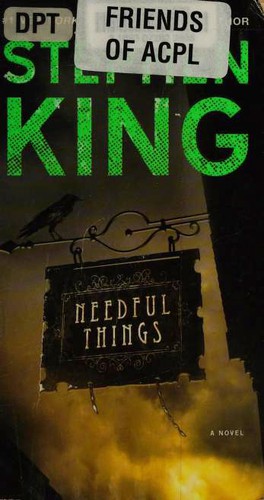Review of 'Isagoge' on 'Goodreads'
2 stelle
Sostanzialmente una serie di definizioni. Probabilmente è inevitabile che sia interessante solo per gli specialisti.
Questo collegamento si apre in una finestra pop-up
Sostanzialmente una serie di definizioni. Probabilmente è inevitabile che sia interessante solo per gli specialisti.
Un romanzo sull'impossibilità per il narratore di scrivere un romanzo, per questioni stilistiche e narrative che emergono dalla storia e da tutti gli "inserti meta-narrativi" (mi invento il nome tecnico, vabbè, insomma qualcosa meta-qualcos'altro). Intelligente e divertente, ma leggendolo ho avuto la forte impressione che tale tecnica fosse già superata cinquant'anni fa, insomma non stupisce piú nessuno, e resta senza scopo una certa pesantezza linguistica che quindi non appaga molto. Comunque val la pena di leggerlo, anche perché è corto. Qualche citazione qui: it.wikiquote.org/wiki/Tommaso_Landolfi#La_biere_du_pecheur
Kropotkin is a classic, of course, but what I didn't expect is that this book is packed with data and and historical information about different land management structures which existed across Russia before a specific economic model was imposed on everybody. I wish Kropotkin had had the resources to conduct studies of the sort Elinor Ostrom did on Swiss pastures. Now so much has been lost forever.
"John Kerry tells the story of his extraordinary life of public service, from decorated Vietnam …
Back in 2004 I had great hopes for John Kerry, and his digital campaign was very innovative, so I was interested in seeing his take on the classic genre, "memoir to re-write history and raise the profile of one's late career". The book is well written, no doubt, but it remains a bit hard to reconcile the anti-Vietnam war beginnings with everything happened afterwards.
It was nevertheless very interesting to learn about a number of episodes in decades of behind the scenes. There are a few remarkable admissions.

“There are two prices for this. Half…and half. One half is cash. The other is a deed. Do you understand?” …
The real story behind the fiction of an orderly deployment of nuclear weapons, which is simply madness. We conveniently deceive ourselves into thinking that nuclear policy is no longer a threat to humanity, and can be separated from other evils like climate change, or that other issues should take priority. But how can we be so convinced that we'll make the best decisions about the nukes of today, when we've still not learnt our lessons from 1962?
«The real lesson of the Cuban missile crisis–the lesson that is consistently resisted because it marginalizes the value of nuclear weapons–is that nuclear armaments create ht eperils they are deployed to prevent, but are of little use in resolving them.»

A colpi d'ascia. Un'irritazione
Le relazioni personali e romantiche e un mondo della cultura che dalle relazioni molto dipende.
Nothing new here unless you've been living under a rock since 2015, but it's an interesting piece of political communications and a very easy read. It's not all fluff: we get to learn interesting details about a number of concrete policy issues you rarely hear about, like energy saving, from the point of view of what has already happened in legislation rather than vacuous promises.
In this second volume, Popper puts to good use the concepts he developed in the first. I was a bit disappointed because we never get to learn a definition of this "open society", nor how to get there, but maybe that's the point. There is no single answer: Popper only shows us a method, which we need to learn by using it.
I've never had the patience to read Marx or Hegel in the original, and honestly I'm not sure one should, but I'm convinced Popper's analysis is one of the sharpest (at least for an empiricist point of view): it's brutal but also fair.
Every other page contains some insight that you may agree or disagree with, but remains useful food for thought for issues we're still facing some 80 years later, like the problem of NATO or climate change. Some of the concepts I've come to appreciate and …
In this second volume, Popper puts to good use the concepts he developed in the first. I was a bit disappointed because we never get to learn a definition of this "open society", nor how to get there, but maybe that's the point. There is no single answer: Popper only shows us a method, which we need to learn by using it.
I've never had the patience to read Marx or Hegel in the original, and honestly I'm not sure one should, but I'm convinced Popper's analysis is one of the sharpest (at least for an empiricist point of view): it's brutal but also fair.
Every other page contains some insight that you may agree or disagree with, but remains useful food for thought for issues we're still facing some 80 years later, like the problem of NATO or climate change. Some of the concepts I've come to appreciate and use in daily reflection are: the "mysticism" of any theory which proclaims a golden age to be either in the past or in the future; the untenable "psychological reductionism" which simplifies sociological constructs to the point of making them impossible to understand and govern.
A passage from chapter 23: «To sum up these considerations, it may be said that what we call "scientific objectivity" is not a product of the individual scientist's impartiality, but a product of the social or public character of the scientific method; and the individual scientist's impartiality is, so far as it exists, not the source but rather the result of this socially or institutionally organized objectivity of science».